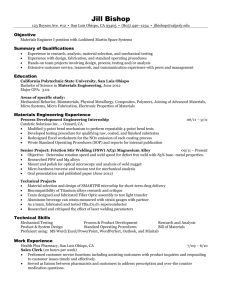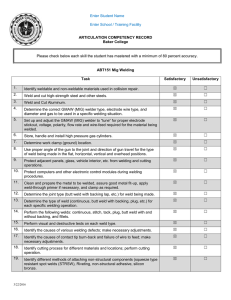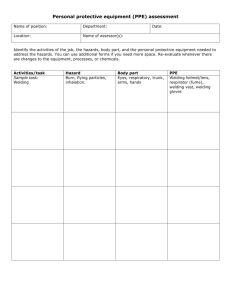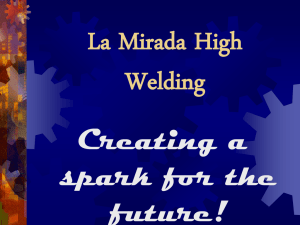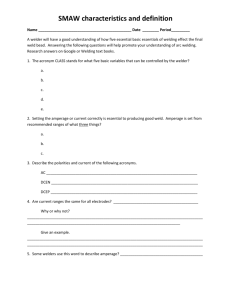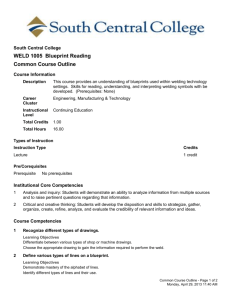Reactive, Refractory, and Precious Metals & Alloys
advertisement
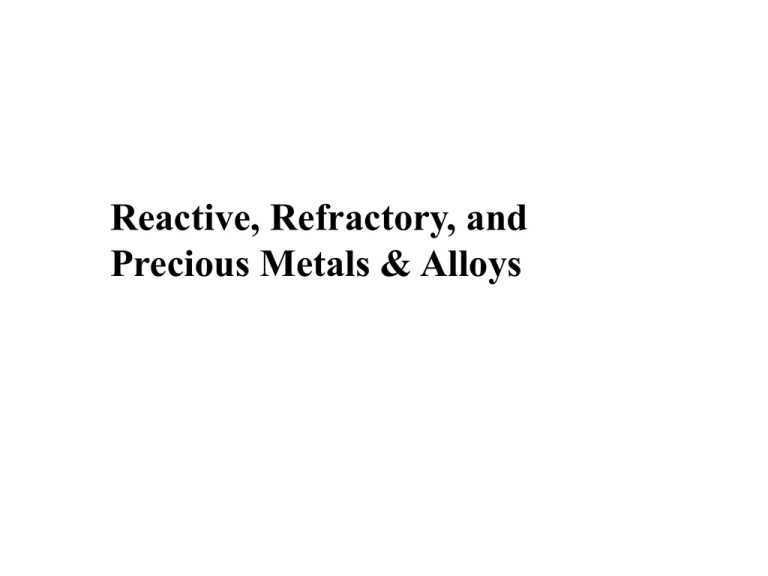
Reactive, Refractory, and
Precious Metals & Alloys
Resistance Welding
Lesson Objectives
When you finish this lesson
you will understand:
•
Keywords
Learning Activities
1. View Slides;
2. Read Notes,
3. Listen to lecture
4. Do on-line workbook
AWS Welding Handbook
Property
Melting Point C
Grain Structure
3
Density g/cm
Electrical Resistance MicroOhm cm
Thermal Cond. Cal/C cm sec
Young's Mod.
Thermal Exp Cm/cm/C
Specific Heat cal/gC
Zirconium
1852
862C…HCP
>862C..BCC
6.5
40
0.040
3
9.9x10
6
4.9x10
0.066
Titanium
1675
882C.. HCP
>882C..BCC
4.5
45
0.041
3
10.85x10
6
9.0x10
0.1642
18-8 Stainless
1400-1427
FCC
8.0
72
0.031
3
20.3x10
6
16.5x10
0.12
Komuro, Welding of Zirconium Alloys,
Welding International Vol 8, 1994
Zirconium
• Similar to Ti but 50% higher density
• Rt-1600F {hcp} Alpha; >1600F {bcc} Beta
• Visible oxide at 400F; loose scale at > 800F
• Pure Zr: UTS 60ksi; YS 40ksi; Elong 18%
• Corrosion resistance in mineral and organic acids, sea water
Uses
• Petrochemical
• Food Processing
• Nuclear Industry (Lower neutron absorption than SS, higher
than other refractory alloys)
Zirconium Alloys
Alpha Stabilizers:
Aluminum, Beryllium, Cadmium, Hafnium (usually present),
Carbon, Oxygen, Nitrogen, Tin
Beta Stabilizers:
Cobalt, Niobium, Copper, Hydrogen, Iron, Manganese,
Molybdenum, Nickel, Silver, Tantalum, Titanium, Tungsten,
Vanadium
Low Solubility, Intermetallic Compounds
Carbon, Silicon, Phosphorous
Zirconium Alloys have been:
• Spot Welded
• Seam Welded
• Flash Welded
• Upset Butt Welded
• Electromagnetic Force Butt Weld
• High Frequency Welded
Surface Cleaning Recommended
• Surface Cleaning - Mechanical or Chemical {HF-HNO3}
• To lower surface resistance to below 50 microhms
• To keep Zirconium Oxide out of weld metal - embrittlement
• Handle with gloves
• Store in low-humidity less than 48 hours
• Higher resistivity for Alloys than steel = lower current
Electromagnetic
Force Butt Weld
Nuclear Fuel Rod
Assembly
Komuro, Welding of Zirconium Alloys,
Welding International Vol 8, 1994
The GTA Welds Have Been Replaced by
Resistance Butt Weld
Weld Current = 20-24 kA
Weld Time = 1/60 sec
Komuro, Welding of Zirconium Alloys,
Welding International Vol 8, 1994
Tube
End
Plug
Post Weld Flash Removal is done
Komuro, Welding of Zirconium Alloys,
Welding International Vol 8, 1994
Dissimilar Metals
Weld Zr Alloys only to itself or other reactive
refractory metals (Titanium, Niobium,
Tantalum, Hafnium)
When welded to Iron or Copper, extremely
brittle intermetallics are formed.
Cu
Fe
Hafnium
• Bright, ductile metal similar to zirconium
• RT-3200F {hcp}; >3200F {bcc}
• Density 2 times zirconium
• Better corrosion resistance than zirconium in water, steam,
molten alkali metals
• Reacts slowly in air above 750F to form oxides
• Reacts above 1650F to form nitrides
• Reacts rapidly above 1290F to form hydrides
Uses
• Nuclear applications making use of its strong neutron absorption
• control rods
• nuclear containers
Hafnium is subject to severe embrittlement by relatively
small amounts of contamination by nitrogen, oxygen,
carbon, or hydrogen. Welding usually done in a
vacuum. Generally not suited for resistance welding.
Beryllium
• {hcp} limited ductility at RT
• Density 70% that of Aluminum
• Cast or Powder metallurgy
• Inherent refractory oxide films
Used
• Aerospace Structures
• Instrument platforms
• Nuclear - low neutron cross section
Beryllium and its compounds in the form of dust,
fumes and vapors are toxic and a serious health
hazard. Because of the chance of expulsion,
resistance welding processes are not considered
for this material.
AWS Welding Handbook
Tantalum
• {bcc} to MP, good ductility at all temps
• Heavy, twice density of steel
• Good corrosion resistance for most chemicals
• Oxidizes > 570F
• Attacked by hydrofluoric, phosphoric, sulfuric acid >300F
• Reacts with chlorine and fluorine gases and C,H,N at
elevated temps
• UTS=30-50 ksi; YS=24-32ksi; Elong= 20-30%
Used
• Chemical handling
• Electrical capacitors
• High Temperature Furnace Components
Tantalum Material Production
Power Metallurgy
• Resistance Welding Not Recommended because porosity in
weld will be excessive
Vacuum Arc Melting & Electron Beam Melting
• Suitable for Resistance Welding
Welding Handbook, AWS
Tantalum Spot & Seam Welding
Alloying with Copper Electrodes & Electrode Sticking is a
Problem
• Weld Under Liquid (exclusion of Air, Cooling)
a. Water
b. Carbon Tetrachloride (old practice - Health Problems)
• Weld Times not to exceed 10 cycles
Rapid Oxidation is a Problem
• Weld using inert gas or hydrogen
Niobium
• {bcc} with no allotropic transformation
• Tensile Strength > 25 ksi; YS > 15 ksi
• Interstitials (O,N,H,C) effect mechanical properties
• Oxidizes rapidly at > 750F
• Absorbs Hydrogen 500-1750F
• Reacts with carbon, sulfur and halogens at elevated Temp
• Excellent Corrosion Resistance in Aqueous solutions
because of tenacious oxide formation
Niobium Alloys
• Alloy with Tantalum, Tungsten, Molybdenum, Hafnium,
Titanium, Zirconium
• Produced into sheets, plates etc.
Welding Handbook, AWS
Niobium Spot & Projection Welding Problems
Electrode Sticking
• AWS recommends using Projection or diffusion welding process
• Cooling with liquid nitrogen might help
Contamination
• Inert shielding from atmosphere
Molybdenum & Tungsten
• {bcc} Structure
• Ductile to brittle transition temp near or above RT
(welds will have little or no ductility)
• low solubility for O, N,C
• Grain Boundary Films of oxides, nitrides, carbides
• Welding performed in high purity inert atmosphere or
vacuum
• Sensitive to stress concentrations and rate of loading
• Additions of Rhenium greatly improves ductility
Mo 40-50%Re, W 20-30%Re
• W-25Re commercially available but tendency to
solidification crack because of sigma phase
Molybdenum & Tungsten Resistance Weld
• Not generally resistance welded
• Exception is thermocouple wires (generally capacitor discharge)
• Exception is Tungsten for lamp filaments
Tungsten Powder Compact Filament Welded to Nickel
Coated Steel Wire (Resistance Butt or Resistance Spot)
Butt Welded
Nickel Coated Steel Wire
W Power Compact
W + BaTiO3 + TiO2
Spot Welded
Mehrotra, V, et al “Multiple Layer composite Electrodes for discharge Lamps” US Patent 5,847,498 Dec 8, 1998 –
see also Patents 6037714, Mar 14, 2000 & 5847497Dec 8, 1998
Resistance Weld on Metal-Halide Lamp
Niobium Pin
With lip (19)
Thermal Expansion
Similar to Ceramic
Halide Resistant
Mo or W Wire
W Electrode
With Coil Wire
(W-Nb & W-W)
Resistance Welds
Huettinger, R & Juengst, S, “Metal-Halide Lamp with Specific Lead
Through Structure, US Patent 6,075,314 Jun 13, 2000
Rhenium
• {hcp} crystal structure - different from other refractory alloys
• Highest modulus of all metals
• No ductile to brittle transition
• Low thermal conductivity (1/2 of Mo; 1/3 of W)
• High resistivity (3-4 times Mo & W)
• Superior tensile and creep properties
• Resistant to surface oxidation; oxides that form have good
conductivity
• However, embrittled by GB penetration of liquid-phase oxides
• Does not form a carbide (I.e. low intra-granular
embrittlement)
• Available in sheet, strip, wire, tubing
AWS Indicates that Rhenium can be resistance
welded but no procedural data could be found
Electro - Brazing of
Reactive and Refractory
Alloys
General Comment For Refractory Alloys
Electro-alloy
*
Ni Sheet
* Caution (see below)
*
Braze Weld w/o
Carbon Block
Messler, RW, “Joining of Advanced Materials”Butterworth-Heinemann, 1993
General Comments
• For Tungsten :
1.) avoid brazing alloys with excessive nickel
to prevent recrystalization in base metal due
to high brazing temperatures
2.) avoid contact with graphite to prevent
carbide formation
• For Molybdenum 1.) prevent oxidation by using protective
coatings
2.) prevent contamination by interstitials
3.) prevent recrystalization by careful alloy
selection
4.) use barrier layer (e.g. chromium) to
avoid diffusion-induced embrittlement by
intermetallic compound formation
• For Tantalum & 1.) remove all reactive gases (O2, CO etc)
Columbium 2.) electroplate with copper or nickel to
prevent oxidation
Messler, RW, “Joining of Advanced Materials”Butterworth-Heinemann, 1993
Messler, RW, “Joining of Advanced Materials”Butterworth-Heinemann, 1993
Messler, RW, “Joining of Advanced Materials”Butterworth-Heinemann, 1993
Messler, RW, “Joining of Advanced Materials”Butterworth-Heinemann, 1993
Messler, RW, “Joining of Advanced Materials”Butterworth-Heinemann, 1993
Gold
• Bright yellow, malleable {fcc}
• Resistance to oxidation
• Good Electrical and Thermal Conductivity
• Alloyed with Copper & silver for jewelry
• Alloyed with zinc, nickel, palladium, platinum for commercial
Resistance welding usually done on a small bench type
spot welder
Silver
• Malleable {fcc}
• Resistance to oxidation
• Good Electrical and Thermal Conductivity
• Passive chemically (except S which tarnish)
• Dissolved Oxygen in liquid causes porosity
• Alloyed with Copper
• It is difficult to weld because of low electrical resistance
• Projection welds for contacts to relays
• Projections on silver to increase current density
• Welded to Phosphor-bronze, copper-nickel, berylliumcopper, brass
Resistance
Welding of
Precious Metal
Contact Tips
Application
Supply Wire
(platinum, gold, iridium,
osmium, palladium, rhodium,
rhenium, ruthenium, tungsten)
Resistance Weld
(34 pounds, 8ms upslope,
1100 amps-16ms weld,
8 ms down slope)
Cut
2nd Weld and Coin
(1410 amps, 400 pounds)
Tribble, D, “Application of Precious Metal to Spark Plug Electrode”
US Patent 6,132,277 Oct. 17, 2000
Cochlear Electrode Array
Shape Memory Rod
Silicon Rubber Body
Electrodes
Platinum Electrode Strips
Spot Welded to Steel
Kuzma, J “Cochlear Electrode Array With Positioning
Stylet” US Patent 6,119,044 Sept 12, 2000
Resistance
Weld Wires
Acid Etch Steel
Plate Away
